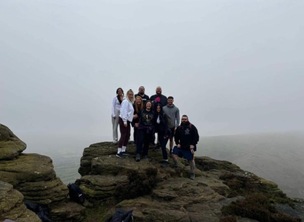A PILOT’S selfless act of bravery which saved dozens of lives 80 years ago - as he sacrificed himself to avoid crashing his plane into rows of houses - is something we have a ‘responsibility’ to remember, believe locals.
Two Commonwealth airmen died as a result of the crash at Pogmoor on January 6, 1942, with 22-year-old Australian pilot Alexander Hollingworth bravely sacrificing himself by choosing to divert the Whitley bomber toward a quarry, now part of Pogmoor Recreation Ground.
And at the site on Thursday, residents gathered to pay their respects alongside schoolchildren from the nearby Horizon Community College.
It’s the first time in two years the service has been able to go ahead, but Tom Parnham - former Pogmoor Area Residents’ Association chairman - said he and a few others have continued to lay wreaths throughout the pandemic.
Tom has taken it upon himself to keep the memory of Sergeant Hollingworth alive, keeping in contact with the man’s family in Australia - who are hoping to attend next year’s event in person.
“There have been people remembering it every year, but it did dip quite a lot,” said the 74-year-old, of Warner Road.
“In 2011, the residents’ association picked it up and decided to make it more of a formal event.
“We think we’ve got a responsibility to keep the memory alive.
“There’s a lot of people who wouldn’t be here if it wasn’t for his bravery.
“Anybody who lived around Cresswell Street, or who had grandparents or great-grandparents there, wouldn’t be here today if he hadn’t have kept the bomber inside the quarry.
“He would be flying north, so would’ve demolished Cresswell Street, Waddington Road, probably part of Winter Road, all that would’ve been flattened.
“This thing weighed about eight tons, and would’ve been doing about 200mph, so would’ve taken a fair swathe of houses away.”
The bomber that crashed was one of three that took off from RAF Dalton near Thirsk on a bombing mission to Cherbourg, France.
Cloudy skies caused the plane to turn back, but when it lost an engine due to a fault, the pilot had to jettison his bombs over the moors near Sheffield.
He decided to fly back to Dalton, rather than the nearest landing point, but further engine complications caused the plane to lose altitude.
Three of the five-man crew bailed out over Locke Park, while the fourth man, Canadian Alexander Buchanan, made his escape too late and died from his landing.
Sgt Hollingworth stayed with the plane and diverted it from its collision course.
Tom said: “He was only 50 miles away from where he was going to land, and at that speed that was only a quarter of an hour.
“They tried to restart the failed engine and it caught fire, and I think that’s what finished them.
“The engines were very underpowered. It had these radial Armstrong Siddeley Tiger engines in, and it couldn’t fly on one engine.
“The new bombers coming out had Rolls-Royce Merlin engines in them.
“Every year when we hold this service, I get a bit more information.”
Dave Griffin, 68, of Porter Avenue, added: “We’re trying to ensure the memory of this event is retained in Pogmoor and the wider area, because it is significant.
“His sole purpose must’ve been to miss the houses, otherwise he’d have bailed out like his colleagues and just let it crash.
“We think that’s an immense act of bravery by somebody in their early 20s, and presence of mind, because for a good while since flying back from the coast, they knew the plane was in desperate condition and probably wouldn’t make it all the way back.”

.png)



























